Science Day
Informatics foster energy efficiency at Erasmus Energy Forum Science Day

An academic perspective from scientists researching the energy industry was presented on the second day of the Erasmus Energy Forum hosted by Rotterdam School of Management, Erasmus University (RSM). It was a closer, academic look at themes explored from a business viewpoint during the first day of the conference and concluded with the ceremonial inaugural address of Dr Wolf Ketter, Professor of Next Generation Information Systems at RSM.
The theme of Day 2 of the Erasmus Energy Forum was Future Energy Business and Energy Informatics; it engaged academic researchers in a dialogue that examined the future of energy business, especially in the context of how energy informatics can foster energy efficiency. The two-day conference was organised by the Erasmus Centre for Future Energy Business (ECFEB).
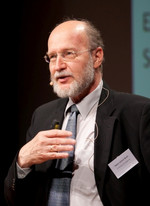 Day 1 the previous day was devoted to the business of future energy, and heard speakers from the top echelons of politics, business and academia on three themes: EU policies and markets; energy microgrids and new business models; and financing sustainable energy. The consensus was that the energy industry needs a common European framework if it is to successfully transition to sustainable sources of energy, and it will rely on smartgrids. You can read more about Business Day here.
Day 1 the previous day was devoted to the business of future energy, and heard speakers from the top echelons of politics, business and academia on three themes: EU policies and markets; energy microgrids and new business models; and financing sustainable energy. The consensus was that the energy industry needs a common European framework if it is to successfully transition to sustainable sources of energy, and it will rely on smartgrids. You can read more about Business Day here.
Keynote speakers on the Science Day were Professor Ad van Wijk of Delft University of Technology with Our car as powerplant, followed by The Energy Turnaround in Germany and the need for academic research by Professor Ulrich Buhl from the University of Augsburg.
Two sessions of academic papers were followed by an academic panel session moderated by Professor Richard Watson from the University of Georgia, and featuring panellists: Prof. Ad van Wijk, Delft University of Technology; Prof. Coby van der Linde, Clingendael International; Energy Programme (CIEP); Prof. John Collins, University of Minnesota; Prof. Ulrich Buhl, University of Augsburg; Prof. Maria Gini, University of Minnesota; Prof. Eric van Heck, RSM.
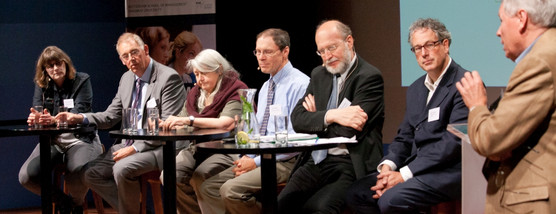
Erasmus Energy Science Award
The Erasmus Energy Science Award, sponsored by Rabobank, was announced and presented by Volker Beckers, chairman of the Advisory Board of the ECFEB. The winning paper proposes a decentralized smart charging algorithm for customers with electric vehicles that offers savings on their electricity bills and reduces peak demand; Smart Charging Of Electric Vehicles Using Learning Agents. Co-authors are Konstantina Valogianni and Prof. Wolf Ketter from RSM and Dr John Collins, from the University of Minnesota, Minneapolis, USA. Runner-up in the Erasmus Energy Science Award was Efficient Heuristics for Power Constrained Planning of Thermostatically Controlled Loads by a team from Delft University of Technology in the Netherlands; Frits de Nijs, Mathijs de Weerdt, and Matthijs Spaan.
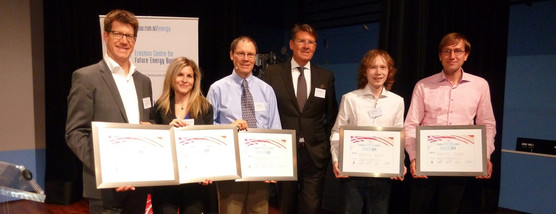
Professor Wolf Ketter’s Inaugural Speech
 Dr Wolf Ketter’s nomination as Professor of Next Generation Information Systems at RSM was officially recognised with his inaugural address at the conclusion of the Erasmus Energy Forum. His subject, Envisioning Sustainable Smart Markets and Enabling Sustainable Smart Markets took into account business, society and academic viewpoints in the search for more sustainable ways of living. Ketter said market mechanisms and intelligent decision support can be effective in solving large-scale resource allocation problems of this kind, but only if the market design reflects the social costs. Information systems have a central role in helping to devise solutions. He looked at the challenges and opportunities involved for information systems researchers, and set out an agenda for sustainable smart markets research, centred on collaborative approaches focusing on three overlapping areas: market and learning agent design; market evaluation using autonomous learning agents, and real-time decision support.
Dr Wolf Ketter’s nomination as Professor of Next Generation Information Systems at RSM was officially recognised with his inaugural address at the conclusion of the Erasmus Energy Forum. His subject, Envisioning Sustainable Smart Markets and Enabling Sustainable Smart Markets took into account business, society and academic viewpoints in the search for more sustainable ways of living. Ketter said market mechanisms and intelligent decision support can be effective in solving large-scale resource allocation problems of this kind, but only if the market design reflects the social costs. Information systems have a central role in helping to devise solutions. He looked at the challenges and opportunities involved for information systems researchers, and set out an agenda for sustainable smart markets research, centred on collaborative approaches focusing on three overlapping areas: market and learning agent design; market evaluation using autonomous learning agents, and real-time decision support.
For more information about the Erasmus Centre for Future Energy Business, see www.rsm.nl/energy
Session 1: Smart Grid and Energy Storage
- Energy Informatics in Smart Grids: Agent based Modelling of Electricity Markets: Jurica Babic and Vedran Podobnik
- An adaptive and unifying Energy Option, State and Assessment Model for Hybrid Energy Systems: Christian Derksen and Rainer Unland
- Efficient Heuristics for Power Constrained Planning of Thermostatically Controlled Loads: Frits de Nijs, Mathijs de Weerdt and Matthijs Spaan (nominated for the Erasmus Energy Science Award).
- Using Inherent Thermal Energy Storage Capacity of District Energy Systems to Optimize Energy Demand and Consumption: Cameron Zahedi, Thomas Lawrence, Richard Watson, Jason Perry and Marie-Claude Boudreau
Session 2: Electric Vehicles and Demand Balancing
- Real-time energy information for real-time energy-use: Anders Dalén, David Dauer and Timm Teubner
- Learning Electricity Tariff Choice Behavior for Autonomous Decision Making: Markus Peters and Wolfgang Ketter
- Distributed Smart Charging of Electric Vehicles Using Learning Agents: Konstantina Valogianni, Wolfgang Ketter and John Collins (nominated for the Erasmus Energy Science Award).
- Rule-based control for scheduling electric vehicle charging on the imbalance market: Derck Koolen, Frederik Ruelens and Fjo De Ridder
- Balancing Electricity Markets With Electric Vehicles: Micha Kahlen, Wolfgang Ketter and Jan van Dalen
Energy Informatics in Smart Grids: Agent-based Modelling of Electricity Markets
 Jurica Babic, Vedran Podobnik, Faculty of Electrical Engineering and Computing, University of Zagreb, Croatia
Jurica Babic, Vedran Podobnik, Faculty of Electrical Engineering and Computing, University of Zagreb, Croatia
The electric power systems are undergoing major modernization process due to latest demands that are placed on the electrical grid. A new generation of electric power systems, called the smart grid, emerges through the modernization process. The “smarts” in the smart grid are mainly achieved through vertical extension of the existing electric power systems with the (i) information and communication technology (ICT); and (ii) market layers. This paper provides conceptual study of modelling the latter of these layers, i.e., the smart grid electricity market modelling. The special focus is placed on the agent-based modelling as a viable energy informatics approach for addressing the issue of market modelling, especially in the complex environment such as the smart grid.
An Adaptive and Unifying Energy Option, State and Assessment Model for Hybrid Energy Systems
Christian Derksen, Rainer Unland, Institute for Computer Science and Business Information Systems, University of Duisburg-Essen, Germany.
The ongoing conversion of our energy supply experiences great interest from many different market players that were originally working outside the energy domain. As a consequence, a vast amount of proprietary solutions for ‘smart’ energy applications is flooding the market. This turns out to be a problem rather than part of the solution for the systematic development of future energy grids. Additionally, there is an absence of necessary unifications and standards blocking further developments that would enable the creation of novel market-driven and hybrid control solutions for various types of technical systems. To overcome these problems, we propose here the foundation of our Energy-Agent approach by means of a generalising energy option and state model that provides the needed understanding and the economical assessment options for any technical system.
Therefore, we present and discuss an exemplary use case for this energy option model that illustrates the applicability of this approach for hybrid energy systems. Overall, we believe that this approach is a good but also a necessary base for the further systematic development of the future hybrid energy grid.
Efficient Heuristics for Power Constrained Planning of Thermostatically Controlled Loads
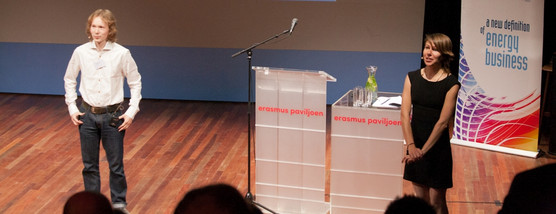
Frits de Nijs, Mathijs de Weerdt, and Matthijs Spaan, Delft University of Technology, the Netherlands.
Thermostatic loads are promising energy buffers that could be unlocked through Demand Response. Existing research has shown that an aggregation of thermostatic loads can be made to follow a power curve using reactive control. In this paper we investigate the use of planning to proactively control an aggregation of Thermostatic Loads as storage to overcome temporary dips in power availability. We first present a formal problem definition of the planning problem under consideration, and apply Dynamic Programming to it to obtain an optimal solution. However, because we can prove the problem to be NP-complete, we need efficient heuristic solutions to solve practical instances. Therefore, we then extend the Dynamic Programming solution with approximations of the state and action space to obtain efficient heuristic solutions. We evaluate our proposed heuristics through simulation on instances with a range of power capacity constraints, and show that they are able to obtain a factor two improvement over the reactive approach under the hardest power constraints.
Using Inherent Thermal Energy Storage Capacity of District Energy Systems to Optimize Energy Demand and Consumption
Cameron Zahedi, Thomas Lawrence, Richard Watson, Jason Perry, Marie-Claude Boudreau, University of Georgia, Athens, Georgia, USA.
 The continued growth in electricity demand in developed and developing countries has led to concerns about the electrical grid and its ability to provide sufficient power during peak demand periods. One common method for reducing peak electrical demand in cooling dominated climates is through the use of thermal energy storage. The use of the inherent thermal energy storage built into a distribution network is just now being realised as a potential tool for addressing peak demand response in district energy systems. This paper outlines: (1) modelling development for a tool that allows the simulation of a chilled water distribution network that provides cooling to multiple buildings; and (2) the information needs to properly validate the model and use it to achieve peak electrical demand reduction. The model predicts the chilled water loop temperatures during times of the day when the thermal storage is being charged or being drawn from; or during idling modes where the water temperature is being maintained within predetermined upper and lower temperature limits. Initial results from application of the model indicate that savings on total energy costs and possibly net overall energy use are possible, however additional optimisation features need to be added to the model to develop an optimal control strategy.
The continued growth in electricity demand in developed and developing countries has led to concerns about the electrical grid and its ability to provide sufficient power during peak demand periods. One common method for reducing peak electrical demand in cooling dominated climates is through the use of thermal energy storage. The use of the inherent thermal energy storage built into a distribution network is just now being realised as a potential tool for addressing peak demand response in district energy systems. This paper outlines: (1) modelling development for a tool that allows the simulation of a chilled water distribution network that provides cooling to multiple buildings; and (2) the information needs to properly validate the model and use it to achieve peak electrical demand reduction. The model predicts the chilled water loop temperatures during times of the day when the thermal storage is being charged or being drawn from; or during idling modes where the water temperature is being maintained within predetermined upper and lower temperature limits. Initial results from application of the model indicate that savings on total energy costs and possibly net overall energy use are possible, however additional optimisation features need to be added to the model to develop an optimal control strategy.
Real-Time Energy Information for Real-Time Energy Use: Quantitative and qualitative experimental evidence
Anders Dalén, Timm Teubner from the Institute for Information Systems and Marketing at Karlsruhe Institute of Technology, Karlsruhe, Germany, and David Dauer from the Institute for Information Systems and Marketing Forschungszentrum Informatik, Karlsruhe, Germany.
Real-time energy-use feedback has been shown either to lead to substantial savings or only negligible changes. How energy information is used in correlation with energy use is little understood as there are few studies that investigate the interaction in detail. To explore this aspect, an experiment with real-time energy feedback is developed. Utilizing open-source hardware and web-display technology, 30 households’ interface interactions and energy use are monitored over four months. Cross-correlation analyses of 13 households with consistent measurements are isolated and examined. The results indicate that correlating information use and energy use can provide researchers with a quantitative insight into the different ways the participants interacted with the provided monitors. In-depth interviews with the participants about their experiences substantiated the findings by providing qualitative accounts for how the energy use information was used in relation to the use of appliances. The study utilizes with an energy information system that monitors and provides real-time energy feedback and contributes with a combination of quantitative and qualitative results through a mixed method approach to evaluate correlations between information use and energy-use. Based on the findings, future research venues are discussed.
Learning Electricity Tariff Choice Behaviour for Autonomous Decision-Making
Markus Peters and Wolfgang Ketter, Erasmus University, Rotterdam, Netherlands
While information systems have revolutionised the provisioning of decision-relevant information and have improved human decisions in many domains, autonomous decision-making remains hampered by systems' inability to faithfully capture human preferences. We present a computational preference model that learns from limited data by pooling observations across like-minded users. Our model is capable of quantifying the certainty of its own predictions as input to autonomous decision-making tasks, and it infers probabilistic segments based on user choices in the process. We evaluate our model on real-world preference data collected on a commercial crowdsourcing platform, and we find that it outperforms both individual and population-level estimates in terms of predictive accuracy and the informativeness of its certainty estimates.
Distributed Smart Charging Of Electric Vehicles Using Learning Agents
Konstantina Valogianni, Wolf Ketter, Erasmus University Rotterdam, the Netherlands, John Collins, University of Minnesota, Minneapolis, USA
Electric Vehicles (EVs) and their integration in the smart grid are challenges that sustainable societies have to tackle. Uncontrolled EV charging increases peak demand which needs extra grid infrastructure to be covered effectively, a costly solution. We propose a decentralized smart charging algorithm for EV customers that offers savings for the individual adopters on their electricity bill and at the same time reduces peak demand, alleviating smart grid from critical strains. We implement smart charging through learning agents that act on behalf of EV owners and examine the effect of our algorithm under the prism of a competitive energy market.
Rule-Based Control For Scheduling Electric Vehicle Charging On The Imbalance Market
Derck Koolen, Frederik Ruelens, Fjo De Ridder and Ronnie Belmans, Department of Electrical Engineering ESAT- ELECTA, KU Leuven, Leuven, Belgium
This paper presents a rule-based control strategy for a flexibility aggregator on the Belgian imbalance market. In this setting the flexibility aggregator can deviate from its day-ahead planning using a set of simple rules, based on historical data of the imbalance price. The strategy is validated on the Belgian electricity market for a flexibility aggregator with a fleet of 1,000 electric vehicles for the year 2013. The simulation results show that using a simple rule-based controller, we were able to reduce the daily electricity cost of the flexibility aggregator by 9 per cent.
Balancing Electricity Markets with Electric Vehicles
Micha Kahlen, Wolfgang Ketter, Jan van Dalen, Rotterdam School of Management, Erasmus University, the Netherlands.
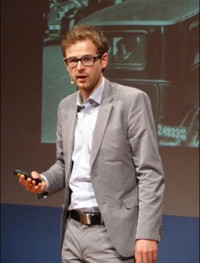 Coupling demand and supply in electricity grids becomes increasingly challenging with intermittent renewable energy sources entering the market. Smart grid addresses this challenge with intelligent information systems to balance electricity production with consumption. This research considers a specific component of the smart grid, namely electric vehicles and how energy wholesale market price signals can be used to balance the electrical grid with increasing renewable energy content. This concept is considered and appraised against the triple bottom line. We evaluate its performance from a fleet-owner perspective that co-ordinates the balancing and makes arbitrage profits on the energy market. Profitable results induce fleet owners to engage in the suggested trading strategy. Besides also the impact for society and how the electricity price that they pay is considered, it is striking that the electricity price is significantly reduced for all people. Finally an assessment of carbon emission development under this trading strategy is analysed. A reduction in emissions makes the strategy desirable from a ‘planet’ point of view.
Coupling demand and supply in electricity grids becomes increasingly challenging with intermittent renewable energy sources entering the market. Smart grid addresses this challenge with intelligent information systems to balance electricity production with consumption. This research considers a specific component of the smart grid, namely electric vehicles and how energy wholesale market price signals can be used to balance the electrical grid with increasing renewable energy content. This concept is considered and appraised against the triple bottom line. We evaluate its performance from a fleet-owner perspective that co-ordinates the balancing and makes arbitrage profits on the energy market. Profitable results induce fleet owners to engage in the suggested trading strategy. Besides also the impact for society and how the electricity price that they pay is considered, it is striking that the electricity price is significantly reduced for all people. Finally an assessment of carbon emission development under this trading strategy is analysed. A reduction in emissions makes the strategy desirable from a ‘planet’ point of view.

